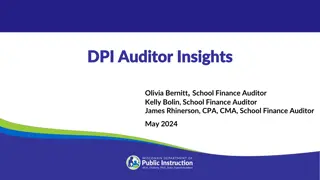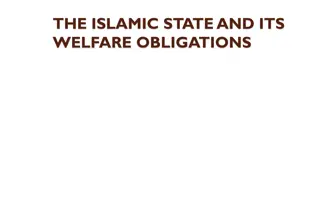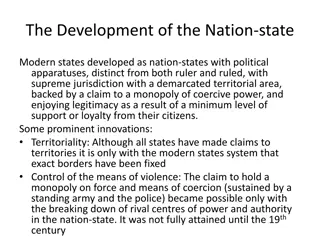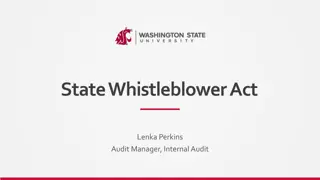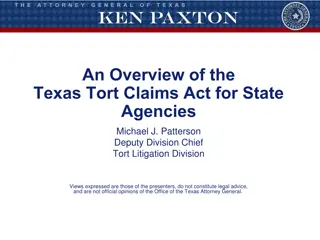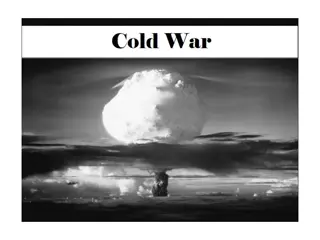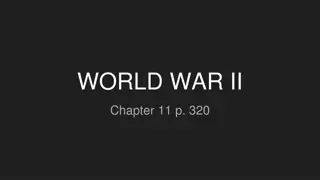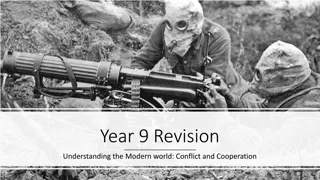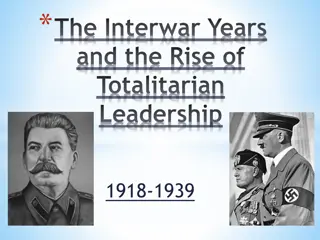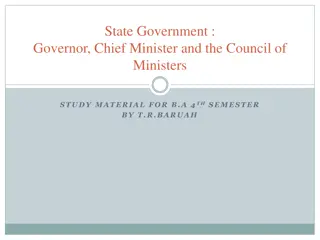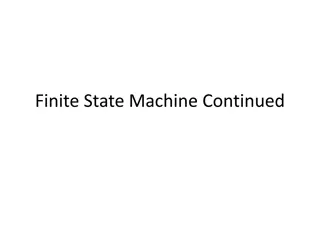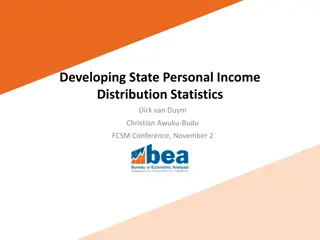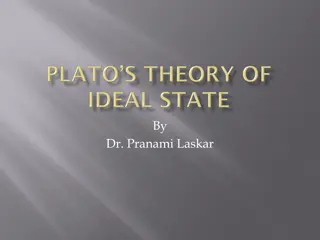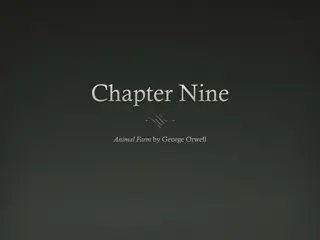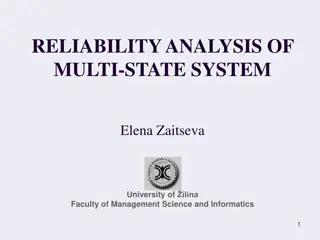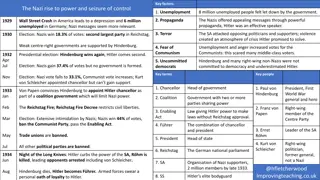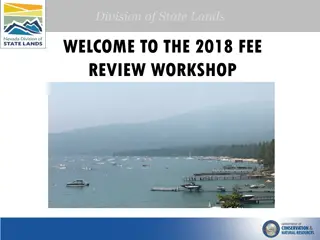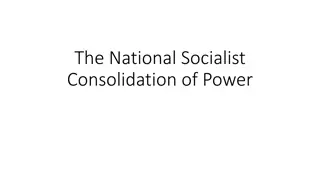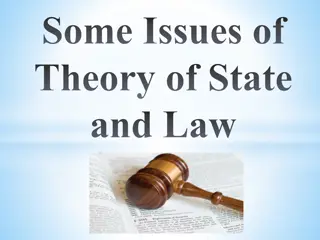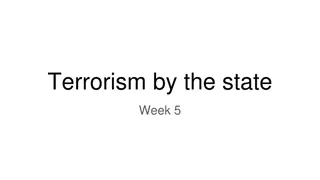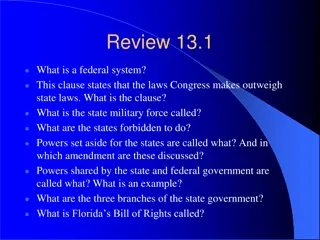Possible Analog States of the Hoyle State in Heavier Nuclei
Research conducted at the National Research Centre, Kurchatov Institute, explores possible analogs of the Hoyle state in heavier 4N nuclei, focusing on the 7.65 MeV 0+2 state in 12C (Hoyle state). The study reveals insights into the structure and characteristics of the Hoyle state, crucial for under
0 views • 12 slides
DPI Auditor Insights and State Audit Guidelines Overview
This collection of images and descriptions provides insights into DPI Auditor activities, state audit guidelines, and updates related to state major program determinations. The State Single Audit Guidelines for Wisconsin School Districts are highlighted, along with the State Audit Manual overview an
3 views • 36 slides
Employee Rights in Colorado State Classified System
The State Personnel System in Colorado provides certain rights and protections for employees in state classified positions, including appeal and grievance rights. Classified employees must adhere to employment laws and are safeguarded against discrimination, retaliation, and harassment. Various fede
0 views • 72 slides
The Historical Significance of the First Islamic State in Medina
The Islamic State in Medina established by Prophet Muhammad marked the beginning of a new era in Islamic history. It was the first welfare state, where divine teachings were implemented under his guidance. This state pioneered the integration of spiritual and temporal authorities, setting the founda
0 views • 60 slides
Evolution of the Nation-State and Modern State Concepts
The development of the nation-state marks a significant shift in political organization, characterized by centralized power, territoriality, and legitimacy gained through citizen support. Key innovations include territorial demarcation, monopolization of coercion, impersonal power structures, and th
0 views • 8 slides
Overview of State Whistleblower Act in Washington State
The State Whistleblower Act in Washington State, governed by the Revised Code of Washington (RCW) 42.40, provides a mechanism for state employees to report improper governmental actions. The Act aims to encourage whistleblowers to come forward, prohibits retaliation, and authorizes remedies for viol
0 views • 28 slides
State Pension Plan Provisions Changes Effective July 1, 2022
The 2017 collective bargaining agreement between the State and the State Employees Bargaining Coalition introduced changes to retirement terms for state employees, affecting members of the State Employees Retirement System (SERS) and the Alternate Retirement Plan (ARP). Changes include adjustments t
5 views • 15 slides
The Ruthless Reign of Joseph Stalin in the Soviet Union
Joseph Stalin rose to power in the USSR after Lenin's death, implementing totalitarian control through purges, collectivization, and propaganda. His regime led to millions of deaths, forced labor camps, and a cult of personality, shaping Soviet society through fear and oppression.
0 views • 8 slides
Understanding the Texas Tort Claims Act for State Agencies
The Texas Tort Claims Act (TTCA) outlines the scope of tort liability for State entities and employees during their state employment. State entities are represented by the Office of the Attorney General, and specific provisions apply to state entities separate from municipalities. This overview cove
0 views • 16 slides
Analysis of Clocked Sequential Circuits and Parity Checkers
This chapter delves into the analysis of clocked sequential circuits, focusing on topics such as sequential parity checkers, signal tracing, state tables and graphs, and models for sequential circuits. It covers concepts like Mealy and Moore machines, state equations, state graphs, timing charts, an
0 views • 38 slides
The Cold War: Rivalry and Tension Between Superpowers
The Cold War, lasting from post-World War II to the 1980s, was defined by political tension and rivalry between the United States and the Soviet Union. Despite never engaging in direct military combat, both sides competed through political maneuvering and propaganda, impacting global conflicts and t
0 views • 11 slides
Insights into Oligarchical Collectivism and Class System in Orwell's 1984
In George Orwell's "1984," the disruptive events of Hate Week reveal the manipulative nature of the Party, as Oceania unexpectedly shifts enemies from Eurasia to Eastasia. The book explores the themes of oligarchical collectivism through Emmanuel Goldstein's book and the rigid class system that divi
0 views • 27 slides
The Rise of Totalitarian Regimes in World War II
In the aftermath of World War I, several European countries fell into economic depression and embraced totalitarian regimes led by leaders like Mussolini in Italy, Stalin in the Soviet Union, Hirohito in Japan, and Hitler in Germany. These leaders wielded total control over their citizens, militariz
0 views • 30 slides
Understanding the Modern World: Conflict and Cooperation in Year 9 Revision
This revision material covers various aspects of conflicts and cooperation in the modern world, focusing on World War I and World War II. It discusses the causes of both wars, life changes during the wars, the rise of totalitarian governments, the Holocaust, British involvement in WWI, trench warfar
0 views • 10 slides
Understanding the State Design Pattern in Software Development
The State Design Pattern is a Behavioral pattern similar to Strategy, allowing objects to change behavior based on internal state changes. This pattern involves defining different states and their implementations to control object behavior dynamically. Real-life examples like managing mood states an
0 views • 14 slides
The Interwar Years: Rise of Totalitarian Leaders & Global Impact (1918-1939)
Explore the significant events of the Interwar Years, including Woodrow Wilson's 14 Point Plan, the Treaty of Versailles, the League of Nations, punishments imposed on Germany, US involvement post-WWI, and the impact of the Great Depression on global economy.
0 views • 21 slides
Understanding Thomas Hobbes' Leviathan: State of Nature, Natural Laws, and Commonwealth
Thomas Hobbes explores the state of nature, natural laws, and the formation of the commonwealth in his work Leviathan. He discusses the equality of men, causes of conflict in the state of nature, and the transition out of this chaotic state towards civil society under a monarchy. According to Hobbes
0 views • 15 slides
Insights into Part II of George Orwell's 1984
In Part II of George Orwell's 1984, Winston embarks on a rebellious journey with the dark-haired girl, Julia, exploring forbidden emotions and acts that challenge the oppressive Party's control. Their secret meetings, desires for freedom, and risky endeavors illuminate the struggle for individuality
0 views • 75 slides
Role of Governor, Chief Minister, and Council of Ministers in State Government in India
The Governor, Chief Minister, and Council of Ministers play crucial roles in the state government of India. The Governor acts as the constitutional head of the state, exercising executive, legislative, financial, judicial, and discretionary powers. The Chief Minister leads the Council of Ministers r
0 views • 7 slides
Insights into George Orwell's Nineteen Eighty-Four and Totalitarian Regimes
George Orwell's novel Nineteen Eighty-Four explores themes of oppression, totalitarianism, and political satire inspired by the oppressive regimes of Nazi Germany and Soviet Russia. The story delves into a dystopian society controlled by the Party, led by figures like Big Brother, reflecting Orwell'
1 views • 25 slides
State Float Project: Research and Create a Parade Float
Engage in a project to learn about a chosen state through research and the creation of a colorful parade float. Students will gather information on geography, famous people, state symbols, and more, neatly compiling it in a packet. Subsequently, they will design a float showcasing the state name, fl
0 views • 16 slides
The Nazis' Consolidation of Power in Germany, 1933-1939
In the period between 1933 and 1939, the Nazis under Hitler orchestrated a series of strategies to maintain power in Germany. This included the establishment of a totalitarian state, implementation of social controls, extensive propaganda campaigns, foreign policy decisions, and economic measures. H
0 views • 38 slides
Understanding Finite State Machines in Digital Logic Design
Finite state machines play a crucial role in digital logic systems, allowing for the implementation of sequential circuit designs. These machines consist of states and transition functions, determining system behavior based on inputs and current state. The output function generates outputs based on
0 views • 35 slides
Simplifying Middlebox Modifications with NFV State Management
Paving the Way for NFV explores how Network Function Virtualization (NFV) simplifies middlebox modifications through state analysis and management. The process involves creating or updating state in middleboxes for various connections, utilizing frameworks for transferring live state, and addressing
0 views • 22 slides
Developing State Personal Income Distribution Statistics
This project aims to create a distributional account for State Personal Income, allowing for the analysis of inequality by state and over time. Using various data sources such as BEA aggregates and IRS statistics, the distributional model provides insights into state-level income inequality. Census
0 views • 17 slides
Philosophy of Plato: The Ideal State and Its Principles
Plato's Republic presents the concept of the ideal state governed by a philosopher king, with distinct classes and systems of communism in property and family. The state emphasizes functional specialization, justice, and totalitarian control but faces criticisms for lacking individual freedom, retai
0 views • 5 slides
Animal Farm Chapter Nine Summary and Analysis
In Chapter Nine of George Orwell's "Animal Farm," Boxer's health deteriorates, leading to a tragic event. Despite his hard work, rations are reduced for all except the pigs and dogs, who indulge in luxuries at the expense of others. The principles of Animalism are twisted to serve the pigs' greed, w
0 views • 11 slides
Travel Policy Changes at Pittsburg State University
Pittsburg State University is implementing new travel policy changes effective January 1, 2016, aligning with federal standards for per diem rates. The changes are a result of the State of Kansas adopting federal rates and will impact all travel occurring after the specified date. The policy update
0 views • 21 slides
Understanding State Aid Regulations in the EU Post-Brexit
State aid regulations play a crucial role in ensuring fair competition within the EU. Post-Brexit, the UK is likely to still be bound by these rules. State aid is defined as any form of aid granted by a Member State that distorts competition, posing challenges for trade between Member States. The EC
0 views • 18 slides
Enhancing Network Function State Transfers
Explore methods to improve the safety, scalability, and efficiency of network function state transfers. Addressing issues related to NF deployments, state management frameworks, and transfer mechanisms. Discuss challenges like safety, efficiency, and scalability with solutions such as re-routing flo
0 views • 16 slides
Minnesota State University Student Association: Empowering Students for a Better Future
Established in 1967, the Minnesota State University Student Association (MSUSA) represents over 70,000 state university students, aiming to bring students' voices to decision-makers. With a budget of $760,000, MSUSA plays a crucial role in advocating for students' needs and influencing policies at t
0 views • 13 slides
State Machine Abstraction for Dynamic Network Actions in SDN
State machines are proposed as a new switch primitive in Software-Defined Networking (SDN) to facilitate dynamic actions at switches. This approach eliminates the need for a priori knowledge, reduces delays, and enables local state-based policies such as stateful firewall, FTP monitoring, and large
0 views • 6 slides
Reliability Analysis of Multi-State Systems in Engineering
Analysis by Elena Zaitseva on the quantification of uncertainty in the behavior of multi-state systems, including binary-state and multiple-state systems. Discusses the principal problem in reliability engineering, the quantification of system models, and the structure function defining system perfo
0 views • 20 slides
The Nazi Rise to Power and Seizure of Control
The ascent of the Nazi party in Germany was fueled by key factors such as high unemployment, effective propaganda, use of terror tactics, fear of communism, and the inadequacy of the existing democratic leadership. Through a series of events and political maneuvers, Hitler was eventually appointed C
0 views • 5 slides
Division of State Lands 2018 Fee Review Workshop Overview
The Division of State Lands in Nevada holds title to Sovereign Lands in trust for the people, allowing for navigation, commerce, fishing, and recreational activities. Senate Bill No. 512 mandates fees for the use of state lands, with the State Land Registrar determining reasonable amounts based on f
0 views • 10 slides
The National Socialist Consolidation of Power - Legal Revolution in the Reichstag
Hitler's consolidation of power in Germany involved strategic maneuvers such as exploiting the Reichstag fire to pass emergency decrees, suspending civil liberties, and ultimately passing the Enabling Act, granting him dictatorial powers. These actions allowed Hitler to establish a totalitarian regi
0 views • 23 slides
The Pedestrian by Ray Bradbury - Analysis and Themes
The story follows Mr. Leonard Mead, who loves walking the city streets at night in a totalitarian society set in 2053. He encounters a police car that stops him, leading to themes of dehumanization through technology, the impact of television, and loneliness. Through detailed textual analysis, the s
0 views • 18 slides
Understanding the State and Law: Key Concepts and Perspectives
The discussion delves into the essence of the state and law, exploring various theoretical approaches such as social, Marxist, and political-legal perspectives. It defines the state as the main institution of the political system integrating social classes, powers, and politics, with persistent feat
1 views • 30 slides
Understanding State Terrorism and Its Implications on Society
State terrorism, employed by governments or factions within them, poses a grave threat to citizens and international peace. This form of terrorism includes intimidation, coerced conversion, and genocide as tools to maintain control. Dictators find it easier to carry out state terrorism in secret, of
0 views • 7 slides
Overview of State Government and State Legislatures in Florida
A federal system is a political framework where power is divided between a central government and individual states. In this system, laws created by Congress take precedence over state laws. The supremacy clause enforces this hierarchy. States are prohibited from actions like declaring war or mintin
0 views • 12 slides

